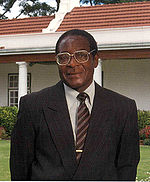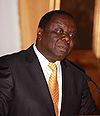
Prime Minister of Zimbabwe
Encyclopedia
The Prime Minister of Zimbabwe is the head of government
in Zimbabwe
. From 1980 to 1987, Robert Mugabe
was the first person to hold the position following independence from the United Kingdom
. He took office when Rhodesia
became the Republic of Zimbabwe on 18 April 1980. This position was abolished when the constitution was amended
in 1987 and Mugabe became President of Zimbabwe, both the head of state
and the head of government.
and later run-off
, negotiations between Mugabe's ZANU-PF and rival candidate Morgan Tsvangirai
's MDC-T
led to a power-sharing agreement in September 2008, providing for the restoration of the office of Prime Minister. Mr Tsvangirai was sworn into the office of Prime Minister on 11 February 2009. The post will hold executive powers, but not the full executive powers it held during the 1980s. For instance, the prime minister will chair the council of ministers and is the Deputy Chairperson of Cabinet and also oversees the formulation of government policies by the Cabinet, but the president will remain head of the cabinet. In addition, the prime minister is a member of the National Security Council
, chaired by the president and sits alongside the heads of the armed forces, intelligence, prison services and police. According to section 20.1.8 of the Constitution of Zimbabwe (No. 19) Amendment, the Prime Minister, Vice-Presidents and Deputy Prime Ministers become ex officio members of the House of Assembly without needing to represent parliamentary constituencies, and the party of a constituency-based MP who concurrently serves in any of the above offices holds the right to nominate non-constituency members to such offices.
Head of government
Head of government is the chief officer of the executive branch of a government, often presiding over a cabinet. In a parliamentary system, the head of government is often styled prime minister, chief minister, premier, etc...
in Zimbabwe
Zimbabwe
Zimbabwe is a landlocked country located in the southern part of the African continent, between the Zambezi and Limpopo rivers. It is bordered by South Africa to the south, Botswana to the southwest, Zambia and a tip of Namibia to the northwest and Mozambique to the east. Zimbabwe has three...
. From 1980 to 1987, Robert Mugabe
Robert Mugabe
Robert Gabriel Mugabe is the President of Zimbabwe. As one of the leaders of the liberation movement against white-minority rule, he was elected into power in 1980...
was the first person to hold the position following independence from the United Kingdom
United Kingdom
The United Kingdom of Great Britain and Northern IrelandIn the United Kingdom and Dependencies, other languages have been officially recognised as legitimate autochthonous languages under the European Charter for Regional or Minority Languages...
. He took office when Rhodesia
Rhodesia
Rhodesia , officially the Republic of Rhodesia from 1970, was an unrecognised state located in southern Africa that existed between 1965 and 1979 following its Unilateral Declaration of Independence from the United Kingdom on 11 November 1965...
became the Republic of Zimbabwe on 18 April 1980. This position was abolished when the constitution was amended
Constitutional amendment
A constitutional amendment is a formal change to the text of the written constitution of a nation or state.Most constitutions require that amendments cannot be enacted unless they have passed a special procedure that is more stringent than that required of ordinary legislation...
in 1987 and Mugabe became President of Zimbabwe, both the head of state
Head of State
A head of state is the individual that serves as the chief public representative of a monarchy, republic, federation, commonwealth or other kind of state. His or her role generally includes legitimizing the state and exercising the political powers, functions, and duties granted to the head of...
and the head of government.
Restoration of office
In the wake of the electoral violence and controversy surrounding the 2008 presidential electionZimbabwean presidential election, 2008
The Republic of Zimbabwe held a presidential election along with a parliamentary election on 29 March 2008. The three major candidates were incumbent President Robert Mugabe of the Zimbabwe African National Union - Patriotic Front , Morgan Tsvangirai of the Movement for Democratic Change , and...
and later run-off
Second round of voting in the 2008 Zimbabwean presidential election
The second round of voting in the Zimbabwean presidential election of 2008 was held between Robert Mugabe and Morgan Tsvangirai after the first round failed to produce a 50% majority for either candidate. The election process was marred by violence against and intimidation of voters and party...
, negotiations between Mugabe's ZANU-PF and rival candidate Morgan Tsvangirai
Morgan Tsvangirai
Morgan Richard Tsvangirai is the Prime Minister of Zimbabwe. He is the President of the Movement for Democratic Change - Tsvangirai and a key figure in the opposition to President Robert Mugabe. Tsvangirai was sworn in as the Prime Minister of Zimbabwe on 11 February 2009...
's MDC-T
Movement for Democratic Change – Tsvangirai
The Movement for Democratic Change Zimbabwe is a political party and the largest party in the House of Assembly of Zimbabwe. It is the main formation formed from the split of the original Movement for Democratic Change in 2005.-Foundation:...
led to a power-sharing agreement in September 2008, providing for the restoration of the office of Prime Minister. Mr Tsvangirai was sworn into the office of Prime Minister on 11 February 2009. The post will hold executive powers, but not the full executive powers it held during the 1980s. For instance, the prime minister will chair the council of ministers and is the Deputy Chairperson of Cabinet and also oversees the formulation of government policies by the Cabinet, but the president will remain head of the cabinet. In addition, the prime minister is a member of the National Security Council
National Security Council
A National Security Council is usually an executive branch governmental body responsible for coordinating policy on national security issues and advising chief executives on matters related to national security...
, chaired by the president and sits alongside the heads of the armed forces, intelligence, prison services and police. According to section 20.1.8 of the Constitution of Zimbabwe (No. 19) Amendment, the Prime Minister, Vice-Presidents and Deputy Prime Ministers become ex officio members of the House of Assembly without needing to represent parliamentary constituencies, and the party of a constituency-based MP who concurrently serves in any of the above offices holds the right to nominate non-constituency members to such offices.
List of Prime Ministers of Zimbabwe (1980–Present)
(Dates in italics indicate de facto continuation of office)| Tenure | Portrait | Incumbent | Affiliation | Notes |
|---|---|---|---|---|
| Republic of Zimbabwe Zimbabwe Zimbabwe is a landlocked country located in the southern part of the African continent, between the Zambezi and Limpopo rivers. It is bordered by South Africa to the south, Botswana to the southwest, Zambia and a tip of Namibia to the northwest and Mozambique to the east. Zimbabwe has three... |
||||
| 18 April 1980 to 31 December 1987 |  |
Robert Mugabe Robert Mugabe Robert Gabriel Mugabe is the President of Zimbabwe. As one of the leaders of the liberation movement against white-minority rule, he was elected into power in 1980... , Prime Minister |
ZANU | Becoming President |
| 31 December 1987 to 11 February 2009 | Post abolished | |||
| 11 February 2009 to Present |  |
Morgan Tsvangirai Morgan Tsvangirai Morgan Richard Tsvangirai is the Prime Minister of Zimbabwe. He is the President of the Movement for Democratic Change - Tsvangirai and a key figure in the opposition to President Robert Mugabe. Tsvangirai was sworn in as the Prime Minister of Zimbabwe on 11 February 2009... , Prime Minister |
MDC – T | |
Affiliations
- ZANU - Zimbabwe African National UnionZimbabwe African National UnionThe Zimbabwe African National Union was a militant organization that fought against the standing government in Rhodesia, formed as a split from the Zimbabwe African People's Union...
- MDC – T - Movement for Democratic Change – TsvangiraiMovement for Democratic Change – TsvangiraiThe Movement for Democratic Change Zimbabwe is a political party and the largest party in the House of Assembly of Zimbabwe. It is the main formation formed from the split of the original Movement for Democratic Change in 2005.-Foundation:...

